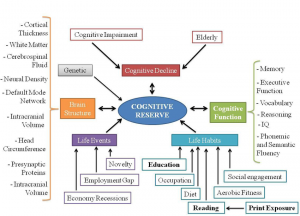Imagine we have developed a medicine that could cure most of the problems that come with aging. If you take it, you have a decreased risk of Alzheimer’s, a better memory, better reasoning ability, plus your brain can heal itself better when damaged. Seems like a pretty good deal! What if I told you that all you had to do was live with some people, play some board games and voluntarily exercise a little bit. Would you be surprised? That’s what research on cognitive research has shown us.

In order to understand exactly what cognitive reserve is, let’s define some of the main components. Brain reserve and cognitive reserve are often used interchangeably when really they are two separate concepts. Brain reserve refers to the number of brain features, like how many synapses and neurons we have and things like the size of actual parts of our brain that allow people to adjust to brain pathology. Cognitive reserve, on the other hand, is how our brain can flexibly adjust to tasks in an efficient manner.
Some animal models have shown us that there are a number of things we can do on our own, without a doctor’s note, to try and decrease our risk of cognitive decline as we age. Some studies have exposed mice to environmental enrichment and found an increase in the number of neurons in their hippocampus, an area of the brain very important in memory. Glial cells, important in supporting the structure of our brain, are found to be created more when rodents participated in physical activity. Environmental enrichment also increased dendritic spine density ( a correlate to memory formation) while physical activity increased angiogenesis, the creation of new blood vessels.
How does cognitive reserve protect us from things like Alzheimer’s?
Part of the pathology of Alzheimer’s is that it makes physical changes in our brain. With people who have higher levels of cognitive reserve, they are able to withstand those changes longer and show fewer symptoms in comparison to those with lower levels of cognitive reserve. Basically, think of cognitive reserve as a mediator between two parties fighting over the future of your brain health. The pathology wants to lead you to a specific clinical outcome and the more mediators (cognitive reserve) you have, the less severe that clinical outcome has to be.
This picture sums up how everything we do affects our brain, which then affects our cognitive reserve.

Our education, intake of information, and life events can all impact cognitive reserve. Genetics plays a component too. And, as we build more cognitive reserve that can help us withstand some of that cognitive decline that comes with aging.
What should I do?
Every now and then, put down your phone and do something that engages your brain and provides some environmental enrichment. Read a book, play a difficult board game, dance, garden, get some exercise and eat right. All the things you already know you should be doing will help your brain to build up a reserve against decline! I know it can be hard to shut off Netflix sometimes, but trust me, your future brain will thank you.
